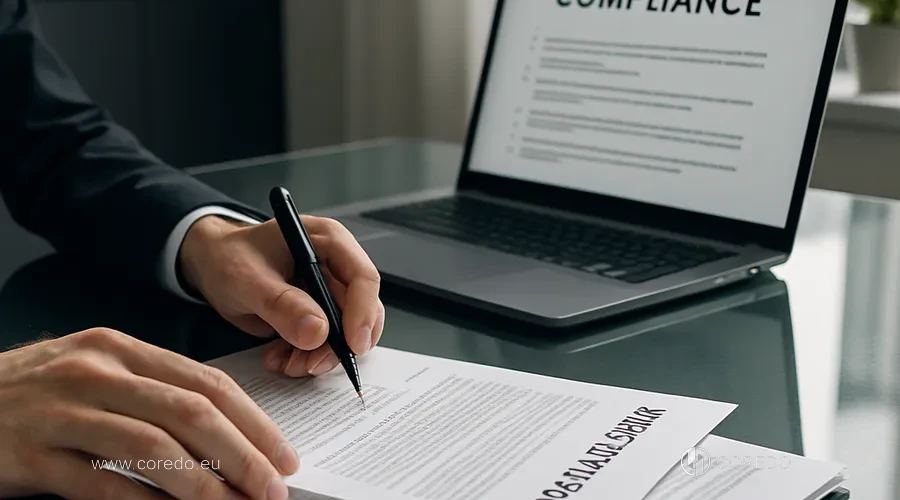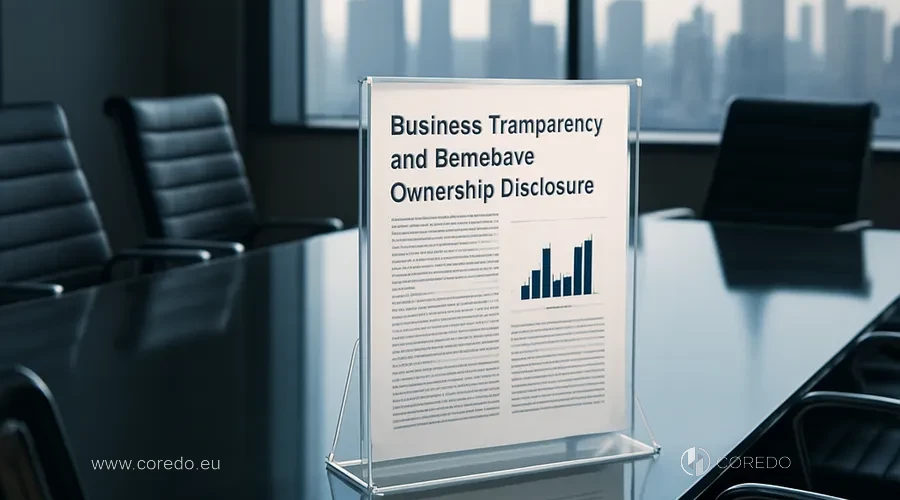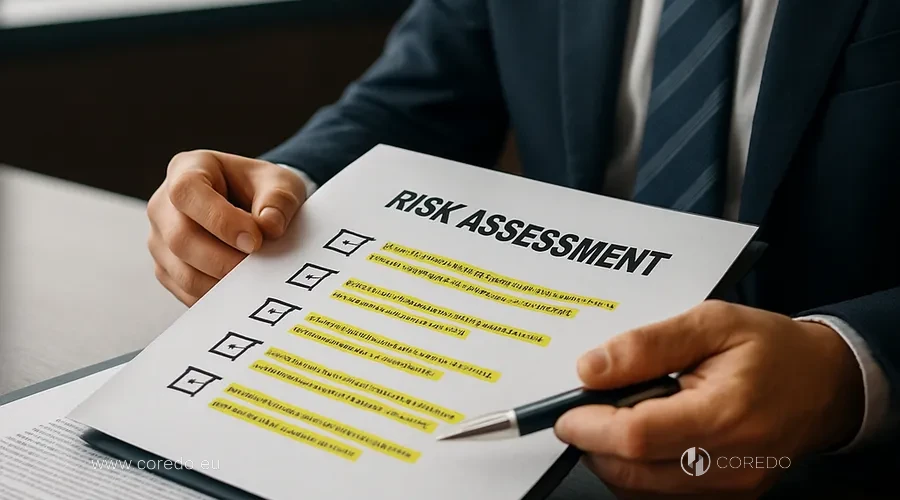In 2025, according to the Edelman Trust Barometer, the level of trust in companies became a key factor for partners, investors and regulators.
Business regulation in the EU, Asia and Africa: current trends

EU regulatory requirements for starting a business are becoming increasingly complex: transparency of ownership structure, disclosure of beneficial owners, mandatory implementation of compliance procedures according to FATF standards and regular audits of corporate reporting.
The COREDO team has implemented projects for company registration and obtaining financial licenses in the EU, the United Kingdom, Singapore and Dubai, where requirements for corporate compliance and anti-corruption practices are particularly high.
Registration of legal entities and compliance: how to meet the requirements

AML/KYC procedures when starting a business: how to avoid mistakes

In the EU and Singapore failure to meet these requirements leads not only to refusal of licensing but also to account freezes, fines and even criminal liability.
The solution developed at COREDO includes automation of compliance processes, integration of digital solutions for client identification and selection of trusted providers of AML services that meet FATF and ISO 37301 standards.
Business transparency and disclosure of beneficial owners: requirements and consequences

Beneficial ownership registers operating in the EU, the UK and a number of Asian countries require disclosure of ultimate owners and transparency of ownership structure.
In one project for a client from Estonia, the implementation of digital platforms for monitoring beneficiaries ensured ownership transparency and increased the company’s corporate rating.
Risks when registering a business: how to minimize them

Strategic risk management when registering a business abroad begins with partner checks and due diligence of potential counterparties.
One typical case: when registering a company in Dubai, a client faced risks related to insufficient transparency of a partner’s ownership structure.
Moving on to vopFor corporate governance and ensuring long-term sustainability, the key becomes building effective internal processes and a transparent decision-making structure in the company.
Corporate governance and business resilience
ESG factors and corporate responsibility: new standards of trust
The integration of ESG factors (Environmental, Social, Governance) is becoming a standard for companies seeking long-term investor trust and sustainable business development.
COREDO’s experience shows that implementing corporate ethics, reporting transparency, and building a sustainable brand image directly affect corporate ratings and the company’s value when entering foreign markets.
Corporate culture and internal audit: tools to prevent reputational losses
At COREDO we implement internal audit systems compliant with international standards (for example, ISO 37301), which allows not only detecting and addressing violations at an early stage, but also shaping a corporate culture of responsibility and transparency.
International law for business by region
How to choose a jurisdiction to register a company considering reputational and regulatory factors
choice of jurisdiction – a strategic stage that determines reputational and regulatory risks, as well as a business’s investment attractiveness.
For example, when entering the EU market it is important to consider not only regulatory requirements for disclosing beneficiaries and reporting transparency, but also the influence of public opinion, digital reputation, and corporate ratings on business scaling opportunities.
| Region | Key regulatory requirements | Main reputational risks | Compliance and AML features |
|---|---|---|---|
| Europe | Ownership transparency, beneficiary disclosure, strict AML/KYC | Sanctions risks, ESG requirements, public registers | High standards, regular audits, process automation |
| Asia | Local KYC specifics, flexibility in disclosure, emphasis on digital solutions | Reputation when working with offshore jurisdictions, difficulty opening accounts | Implementation of digital identification, FATF requirements |
| Africa | Diversity of regulatory regimes, emphasis on anti-corruption measures | Risks of partner due diligence, lack of transparency | Growth in adoption of international standards, cases of ESG integration |
Cases and mistakes: consequences of non-compliance with regulatory requirements
Failure to comply with regulatory requirements leads to account freezes, fines, restricted access to financial services, and long-term reputational losses.
Further digitization of compliance is becoming a key element in increasing business resilience to reputational and regulatory challenges.
Digital transformation of compliance and reputation
Technologies for monitoring and managing reputation: tools and metrics
Modern digital platforms for reputation monitoring allow real-time tracking of company mentions, analyzing digital traces, managing reviews, and conducting reputation audits.
Key metrics for assessing ROI from reputation investments include trends in corporate ratings, the Edelman Trust Barometer index, the number of positive reviews, incident response speed, and partner engagement levels.
Automation of compliance processes: cost reduction and increased reliability
Automation of compliance processes is not only about reducing costs, but also about increasing the reliability of corporate governance.
Recommendations for entrepreneurs and managers
Checklist: how to prepare a company for a regulator inspection
- Conduct an independent internal audit and a reputational audit.
- Ensure transparency of ownership structure and disclosure of all beneficiaries.
- Implement automated KYC/AML procedures and regularly update compliance policy.
- Prepare documentspolicy on corporate governance, internal control and ESG reporting.
- Conduct employee training on corporate ethics and conflict-of-interest management.
- Integrate digital platforms for reputation monitoring and review management.
Strategies to minimize reputational and regulatory risks
- Regularly conduct partner checks and due diligence using OSINT and automated platforms.
- Form strategic alliances with verified AML service providers.
- Implement corporate compliance based on international standards ISO 37301 and ISO 37001.
- Develop crisis PR scenarios and a business reputation recovery plan.
- Integrate ESG factors into corporate governance to increase investor trust.
Metrics and ROI: how to evaluate the effectiveness of investments in reputation and compliance
- Trends in corporate rating and reputational index.
- Number of successful partner checks and absence of incidents.
- Level of business transparency and the speed of passing regulatory inspections.
- ROI from investments in digital solutions for compliance and reputation monitoring.
- Increase in investment attractiveness and access to new financial instruments.
Key findings and recommendations
In the modern world, opening a company abroad requires not only knowledge of the regulatory environment, but also strategic management of business reputation, corporate compliance, and business transparency.
I recommend using the presented tools and checklists as a basis for strategic planning, and if complex issues arise, consulting COREDO experts for an individual solution adapted to the specifics of your business and the chosen jurisdiction.